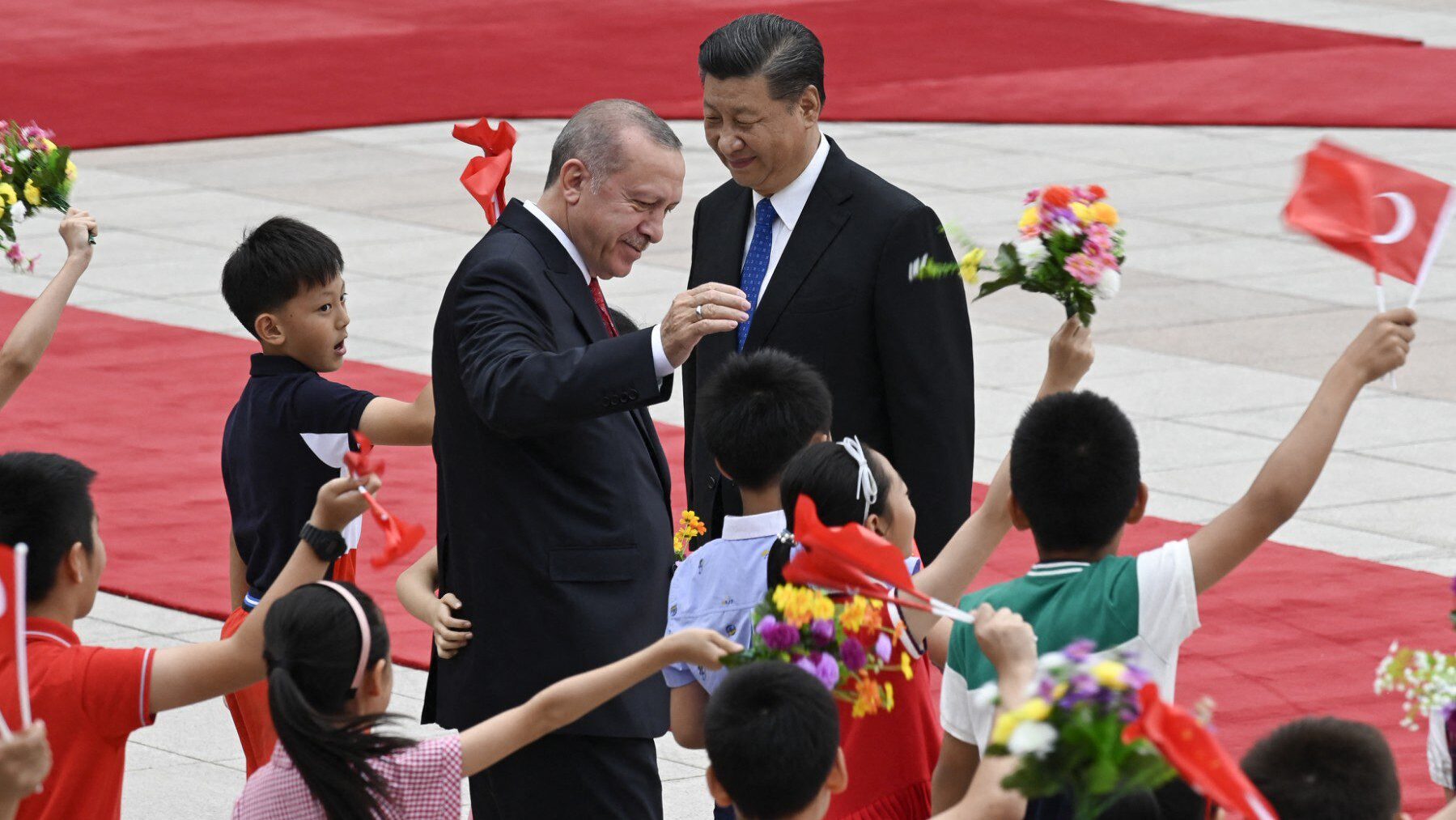
Turkish President Recep Tayyip Erdoğan being welcomed in China by President Xi Jinping in 2019.
Photo: Wang Zhao / AFP
On Monday, September 2nd, Ankara formally submitted its membership application to BRICS, the economic bloc of emerging markets that was conceived to challenge the global hegemony of the West, led by Beijing and Moscow—despite also belonging to the U.S.-led North Atlantic Treaty Organization (NATO).
“Turkey can become a strong, prosperous, prestigious, and effective country if it improves its relations with the East and the West simultaneously,” Turkish President Recep Tayyip Erdoğan said in Istanbul over the weekend. “Any method other than this will not benefit Turkey, but will harm it.”
The president stressed that developing ties with China and Russia through BRICS and other platforms does not mean Turkey forgoes its goal of eventual EU accession either.
“We do not have to choose between the European Union and the Shanghai Cooperation Organization [SCO] as some people claim,” Erdoğan added. “On the contrary, we have to develop our relations with both these and other organizations on a win-win basis.”
As the world’s biggest regional organization, the SCO is a political, economic, and security bloc jointly chaired by China and Russia, with Turkey being a “dialogue partner” since 2013. If BRICS has been described as an alternative to the Western powers’ G7 format, the SCO is described both as Asia’s more loosely integrated version of the EU, as well as an “anti-NATO” made up of rogue states.
So, Turkey’s BRICS application should not come as that much of a surprise after the country’s decade-long involvement with the SCO, but it’s still a major development since, unlike the latter, BRICS has a global reach and is positioning itself as the foremost contender for the West’s worldwide economic dominance, especially after its historic enlargement from five to nine member states at the beginning of this year.
According to a former Turkish diplomat, the move to apply to BRICS was indeed driven by “accumulated frustrations” in Ankara with the West and the European Union especially. Turkey has been an EU candidate country since 1999, but relations worsened and the negotiations were frozen by the European Commission in 2016.
As it became increasingly clear that the lack of progress in Turkey’s EU accession would chase Ankara into China and Russia’s arms, Brussels tried to rectify the situation, albeit way too late. EU countries failed to recognize the country’s strategic importance in time, Turkish officials said, just as they were too slow to understand that Ankara is “not without alternatives.”
Still, the EU tried. It was reported less than two months ago that the EU was working on a three-stage plan to revive ties with Turkey by increasing high-level meetings, relaunching EU investments, and modernizing their customs union to prevent the country from being drawn toward the East. Turkey saw these, however, as nothing but empty promises.
Still, despite these “frustrations,” Turkey’s future BRICS membership should still not be viewed as completely rejecting the country’s traditional Western allies, others insist, but as a way to adapt to changing geopolitical realities.
“This is not the strategy, by Ankara, to replace the West, but it’s a strategy to strengthen relations with non-Western powers at a time when the US hegemony is waning,” said Sinan Ülgen, head of the Istanbul-based think tank EDAM.
Although Turkey’s distancing from the West despite being a key member of NATO has been causing quite an alarm lately, there are also observers who say this “balancing act” might even be beneficial as NATO gains a military ally inside China and Russia’s circle. The economic implications of BRICS gaining another major market, however, could be much more negative.
‘BRICS’ is an acronym made of the first letters of its founders, Brazil, Russia, India, China, and South Africa. In January 2024, they were joined by Egypt, Ethiopia, Iran, and the UAE. Fourteen other (mostly Asian) countries, apart from Turkey, have submitted formal applications so far, with nearly 30 others (primarily African and Latin American countries) having expressed interest in joining sometime in the future.
One of the major goals of BRICS is to use their pooled resources to speed up what they call the “de-dollarization” of world trade and therefore weaken the United States’ economic influence over the globe.
Turkey joining the organization to benefit from the investment opportunities of the BRICS’ ‘New Development Bank’ and to open new trade avenues with China and Russia shows that Ankara believes the project is more likely to succeed than not, and would rather be on the winning side than left behind with the declining West.
